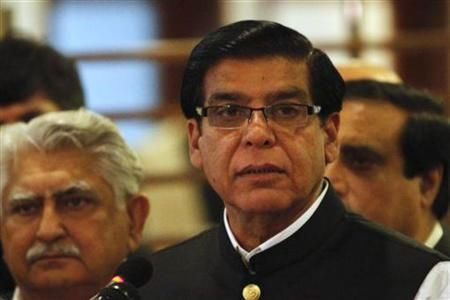Pakistan’s Bizarre Political Merry-Go-Round: Supreme Court Orders Arrest Of PM Ashraf

Only four months ahead of scheduled general elections, Pakistan edges toward the brink of yet another political crisis.
The country’s Supreme Court has ordered the arrest of 16 people, including Prime Minister Raja Pervez Ashraf -- who only took office last June -- in connection with a corruption case.
Specifically, Ashraf will be charged with receiving kickbacks and bribes relating to Rental Power Project (RPPs) contracts while he served as the federal water and power minister in 2010.
Ashraf has denied all charges.
“The chief justice ordered that all concerned, regardless of their rank, who have been booked in the case be arrested and if someone leaves the country, then [the] chairman of [the] National Accountability Bureau will be held responsible along with his investigating team,” said Aamir Abbas, lawyer for NAB, according to Dawn, an English-language Pakistani daily newspaper.
In swift response to the arrest order, an aide to Ashraf, Fawad Chaudhry, accused the court of conspiring with the military to bring down the coalition civilian government of Ashraf and President Asif Ali Zardari.
However, there has been no direct official response yet to the arrest order from either Ashraf or Zardari.
The arrest order, which may not lead to the immediate removal of Ashraf from his seat of power, BBC reported, coincided with a massive demonstration by a popular cleric calling for the toppling of the government. Dr. Tahirul Qadri, a Canadian of Pakistani descent, has been accused of being a puppet of both the military and the judiciary – two powerful Pakistani institutions that have challenged the authority of the civilian government every step of the way.
“The Supreme Court's order to arrest Prime Minister Raja Pervez Ashraf comes in a case the court has been hearing for over a year,” wrote M. Ilyas Khan, BBC correspondent in Islamabad. “This [arrest order] does not automatically lead to his unseating, but … the timing of the court order is suspicious at a time of mass protest and just months ahead of an election.”
The former Prime Minister, Yousuf Raza Gilani, was pressured to resign last June after the Supreme Court convicted him on a contempt charge for failing to lodge a corruption case against President Zardari. (Gilani claimed that as a sitting president, Zardari was immune from prosecution).
Ashraf, whose attorneys will likely delay any attempts by the judiciary to answer corruption charges, is still expected to lead the ruling Pakistan People’s Party (PPP) in May elections.
But there are fears that the military – which has engineered three coups since Pakistan was formed – may again take that route to solidify the power of the army and the judiciary.
Dr. Qadri may inadvertently help move that process along.
The head of the Tehrik-i-Minhajul Quran (TMQ) led a huge motorcade and thousands of followers on a march toward the parliament allegedly against ”government corruption,” demanding it resign. He also praised the Supreme Court for ordering Ashraf’s arrest.
“This president and prime minister … they are now ex-presidents and prime ministers,” he told the crowd. “Their time is over. Dissolve the national and provincial assemblies by the morning… These millions of [our] supporters have spoken. They have rejected your so-called mandate. You are no longer their representatives.”
He added: “[The government] has wasted and brought a bad end to our armed forces, those armed forces who are highly sincere, highly competent and highly capable and highly professional. Even they can’t do anything because the political government isn’t able to deliver anything from this land. Judgments are being passed by our great, independent judiciary but the government is not ready to implement them.”
© Copyright IBTimes 2024. All rights reserved.




















